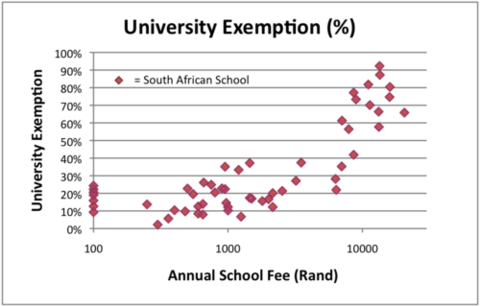
Just over a year ago I was approached by Andrew Einhorn, a UCT grad student, who was interested in implementing an online maths program at Makhaza. All he needed was access to the lab, access to a class and a tutor. A year down the line not only he has completely revamped two of our branches labs in Makhaza and Nyanga, established a formal Khan Academy program in these branches (as well as other locations in Cape Town and rural Eastern Cape), but has produced results at very low costs, and is piloting in schools for 2013.
His passion for creating high impact and stimulating learning environments in township and rural locations often only privy to the wealthy few has seen him start Numeric, an NGO interested in finding ways to bring Khan Academy to South Africa and make it a useful resource to both teachers and learners. He presented an inspiring TEDxUCT talk last year outlining the background, as well as the impact and results Numeric has had. He also posted the following blog on the Khan Academy website:
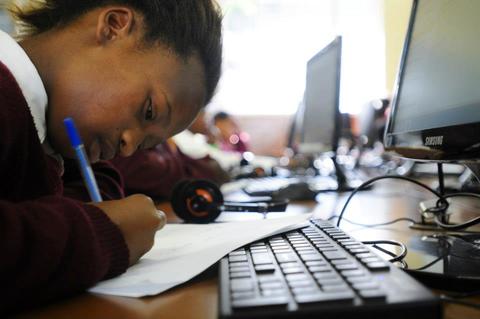
A little over 15 months ago, we started an experiment. We wanted to know if Khan Academy was viable in township (slum) areas in South Africa and if so, what type of impact it might have on numeracy. Numeracy in South Africa is astonishingly weak, with just 2% of Grade 9s scoring over 50% on the annual national assessments in 2012.
And so we set out to see if Khan Academy might be used as a catalyst for change. But before I expound on the results of this experiment, I ought perhaps give a little more background on the environments we’re working in.
Townships in South Africa are not unlike the favelas of Brazil or the slums bordering Delhi and Calcutta in India. They are urban areas that were, until the end of Apartheid in 1994, reserved for non-whites, but have now become residential hubs for the urbanizing masses. They are typically built on the periphery of cities and tend to be characterized by high population density, poverty and unemployment. Picture a ramshackle of makeshift houses constructed out of corrugated iron, wood scraps and cardboard, jigsawed together into a gigantic maze 5 miles wide and 10 miles across. At the risk of generalising grossly, that’s more or less the picture I want you to have in mind as you read this article.
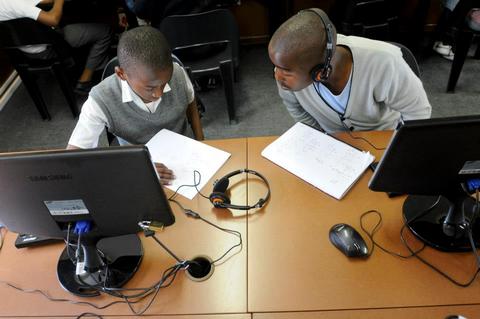
Now, townships in South Africa get a bad rap. They are viewed as ‘dangerous’ places and it is considered unwise to visit them unless you know someone there, or visit them as part of a ‘township tour’. Yet while crime rates in these areas are often high, the reputation does not do justice to the vibrant and persevering people who inhabit them. In particular, townships are YOUNG! On any given day, around two o’clock in the afternoon, the streets flood with uniformed, backpack-toting children on their way home from school. And despite having barely two pennies to rub together, they are meticulously dressed – shiny black shoes, starched white collars – and have aspirations to match. Most of the children in South Africa live in some form of township, which means that children growing up in these environments constitute the better part of the future of our country.
And yet it is supremely difficult to convince our best teachers to go and work in these areas. They are offered good jobs in well-resourced schools most often located in the wealthy suburbs of the cities. Principals at these schools compete fiercely for their skills. And this is as it should be. But it also entrenches the educational bias whereby a child’s access to quality education is directly proportional to the wealth of their family (see chart below).
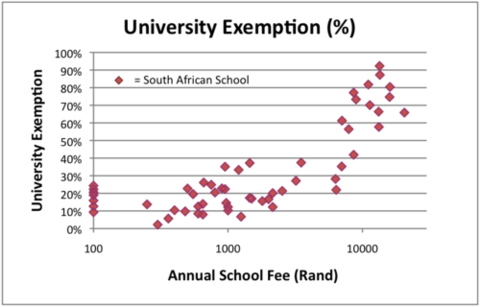
* University exemption rate refers to the percentage of learners who attain the academic marks in their final year of school that are necessary to gain access to South African universities.
So Numeric’s experiment was to see whether we could use Khan Academy, in conjunction with a slightly less skilled (and often unqualified) math coach, to create the high impact and stimulating learning environments enjoyed by kids living in wealthier suburbs.
The opportunity provided by Khan Academy premised on the following: Videos do not argue about where they are played; they are unaffected by crime and environment. Appropriately licensed, they do not cost anything. They do not grow weary, skip class, or grow jaded. Instead, they convey their message enthusiastically, faithfully, clearly – time and time again. A child may watch just as many videos as he/she has appetite for, and need never feel limited by the dragging on of a boring class or an inept teacher. For many children in South Africa, a Khan Academy video will be their first exposure to what we might term ‘world class instruction’. When complemented by the exercises on the Knowledge Map, Khan Academy becomes a powerful tool for turning the tide on numeracy in South Africa.
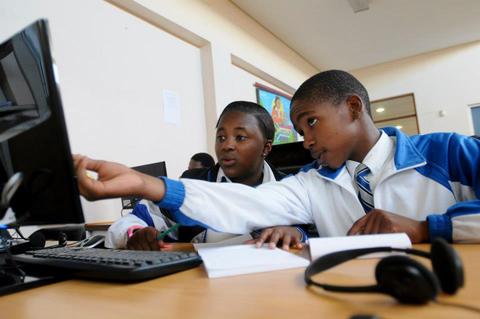
So what were the results of the experiment? Well, it’s probably too early to draw any major conclusions, but we do have a few figures we’d like to share. We currently run 7 Khan Academy classes across 3 different hubs in the Eastern and Western Cape provinces of South Africa. The first pilot group of 20 Grade 9s has just completed its first twelve months of Khan Academy and their numbers are as follows:
* Total Khan Academy hours delivered: 2220
* Total Problems Solved: 27,988
* Total Problems per learner: 1399
* Total Khan Modules Complete: 1232
* Average Modules per learner: 62
Bearing in mind this is an afterschool programme, these are 27,988 math problems that would not otherwise have been attempted. The 62 modules completed by the average learner constitute 62 gaps that those learners have filled. But it’s more about just the numbers; it’s about creating excitement and enthusiasm around learning. This is hard to convey in words, but perhaps a picture will suffice.
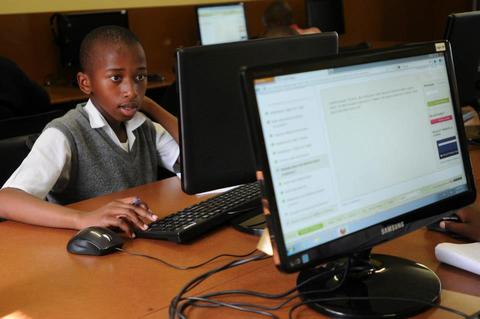
As we always say to our coaches, the tragedy in South Africa is not so much that kids don’t want to learn. It’s that some kids DO want to learn, but can’t. Khan Academy provides us one way to give these kids a world-class education without having to magically replenish our nation’s supply of teachers. And who knows, perhaps one day these kids will become the inspirational and talented teachers we have waited for for so long!
—-
Andrew Einhorn is the founder and current CEO of Numeric.org. His TEDx talk on Numeric.org and Khan Academy is available here.
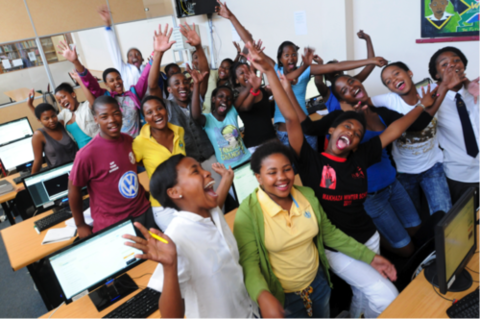
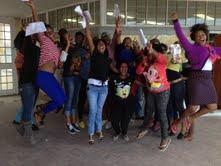

On Thursday 3 January the grade 12 results were released by the Western Cape Education Department and Makhaza achieved an 82% pass rate, up from 55% in 2011. This was testament to the hard work done by the learners and the tutors at the branch.
10 of the learners achieved Bachelor passes with 1 level 7 (83%) pass in Economics, 2 level 6 (71%) passes in Mathematics, 1 level 6 (71%) pass in Mathematical Literacy, 1 level 6 (76%) pass in Life Sciences and 1 level 6 (74%) pass in Accounting. 8 learners achieved Diploma passes and 5 learners Higher Certificate passes. The 5 learners that did not pass the exams all qualified for supplementary exams and we hope that Makhaza will have a 100% pass come the end of the supplementary exams.
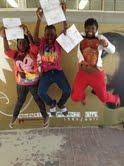
Yibanathi Phaphu, one of the top achievers said that he still couldn’t believe that he passed so well and that he is waiting for the feeling to sink in. He also said that he is looking forward to starting university where he will be doing a B. Comm degree, as he would like to be a Chartered Accountant, at the University of the Western Cape and didn’t expect to get Bs but that he just worked very hard. Sisabelo Pama another top achiever was really excited and couldn’t stop smiling and indicated that she will be pursuing a qualification in Electrical Engineering at Cape Peninsula University of Technology. Nomasomi Gugushe scored 83% for Economics and is planning to study construction management at CPUT. She said “I believe without IkamvaYouth I wouldn’t have passed my grade 12 like I did”.
The day was also marked by a bit of sadness, as we would have loved to see all the matriculants pass first time around, but mostly with joy as learners, parents, staff and tutors all celebrated the successes. The results also bear testament of what the learners are capable of when they really want to do something. In 2011 Makhaza had a lot of difficulties, with the office being petrol-bombed during service delivery protests and the teacher strikes that interupted the school year, but the matriculants of 2012 built on these difficulties and showed that they can achieve and do well even in the face of adversity.
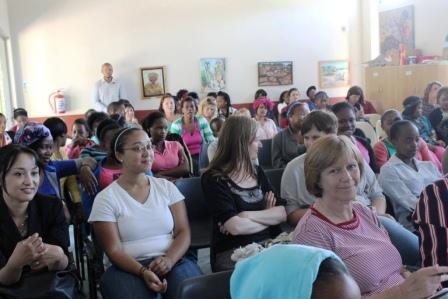
By Sanele Bani (Grade 11 learner)
A group of 100 people composed of parents, partners, volunteers, Masi Library staff and the IkamvaYouth staff were happy to surround and congratulates the 71 Ikamvanites who graduated this year.

Our two masters of ceremony Mawande Sokhaya (ex-learner) and Andisiwe Blou (Grade 12 learner) guided the event in introducing our two motivational speakers: Zintle Mtakati (ex-learner and 2nd year Social Work student at the University of Free State) and Thulisa Mayekiso (graduated student in Psychology at the University of the Western Cape). Thank you to both of them for bringing hope to the current Ikamvanites. In fact, both of them encouraged the audience to deeply believe in their future aspirations, because anyone is able to reach them.
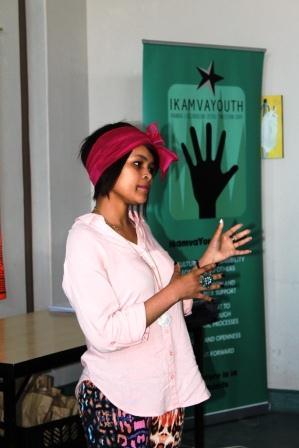
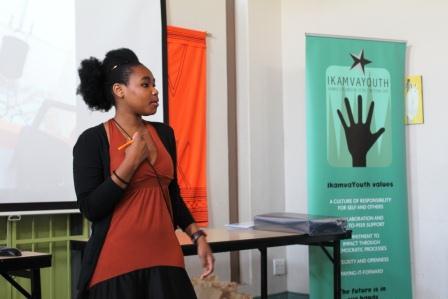
The most anticipated moment was the Attendance awards. 17 Ikamvanites were awarded a Green Certificate – these attended between 75 and 79% of the year. 26 learners got a Silver Certificate – meaning they attended between 80 and 89%. At last, 13 learners received the Gold distinction for being committed, between 90 and 100% attendance. The Silver and Gold learners received a stationery pack and a memory stick. Thank you to the Capitec Bank CSI team.
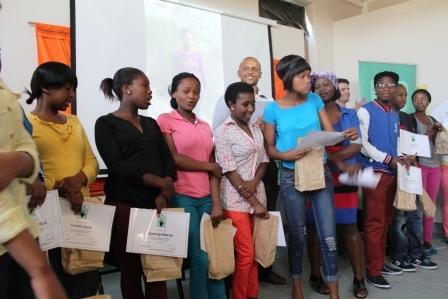
4 more categories were awarded and each received a computer from Capitec Bank CSI. These were:
Uviwe Nqwelo for “Most improved learner”, Ntebuheleng Stuurman and Bongiswa Ngxanga for “Most committed learner”, and Phumza Kibi for “learner of the year” voted by the learners and for “Outstanding leadership”.
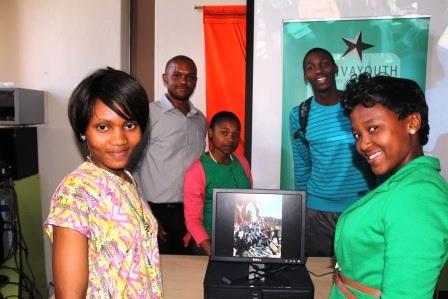
The Masi Branch is happy to thank all the people who are making a difference in the lives of hundreds of learners: the Masiphumelele Library staff , Lea-Ann Moses Magerman (from Capitec Bank), Mignon Hardie (from Cover2Cover), Kwezi Bonani (UCT Humanities recruitment officer), Annemarie Ludick (from the University of Free State), Marjan Ritchie (from MasiCorp), Jen Rousseau (from the Desmond Tutu Youth Centre), Julian (from Pick n’ Pay Family store in Fish Hoek), Kenneth McClarty (from the Olympia Bakery), the Environmental Resource Management team and the WorldTeach and GapYear Volunteers
Thank you for your generosity, through your donations, time, opportunities which will make the future brighter for our communities.
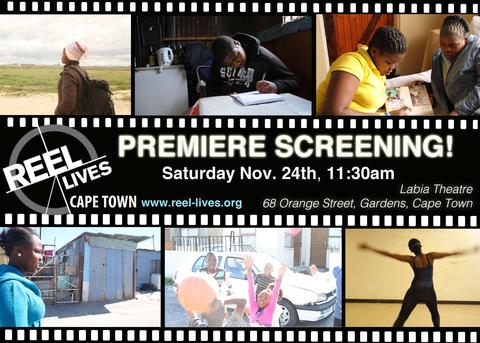
The past three months have seen a few of the Nyanga and Makhaza learners turn into local short film documentary film makers – learning valuable industry skills, while grappling with real issues they face in their lives. Partnering with a US based organisation,
Reel Lives, who use
filmaking media to support education, empowerment and social change.
Each of our learners in the program shot and edited an individual, non-fiction film related to a personal human rights issue in their own lives. Through the process of making these films, they were supported in engaging with their own lives in a unique way, and in experiencing the catharsis of an informal, but powerful, art therapy structure.
Have a look at their teasers, as well as read about the process and what they’ve got up to over the past three months here.
And now please join us in supporting our learners for the premiere of their films!
Saturday November 24th, 11:30am (doors open @ 11am. Please arrive early, limited seating)
Labia Theatre, 68 Orange Street, Gardens, Cape Town
FREE entry, Donations appreciated.
We look forward to seeing you there, please feel free to bring along partners / friends / family


Saturday the 15th of September will remain a memorable day in the history of the Nyanga branch as we held our first ever alumni meeting .
The purpose of the meeting was to launch the IkamvaYouth alumni program, aimed at connecting our alumni at tertiary institutions and finding ways of supporting them so as to ensure higher levels of throughput at university. The alumni program is being piloted at the Nyanga branch and will be rolled out to other branches and the rest of the country where IY has branches.
Mr Richard Wells facilitated the meeting, workshop-style with a group of alumni and current volunteers. The group shared personal experiences about learning to adjust to tertiary education, highlighting the need and importance of an IY alumni program. Melikhaya Tshitshiba of the class of 2008 noted that an alumni group would be invaluable to Ikamvanites in tertiary since there were still many hurdles to scale at university, once Ikamvanites made it there.
A very warm thank you to Mr Richard Wells, our alumni and volunteers who made the meeting possible.
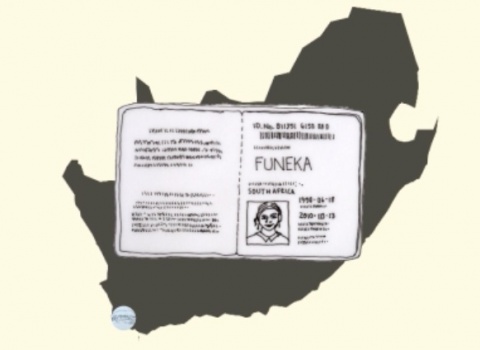
Inspired by the National Planning Commission’s story of Thandi, which Trevor Manuel told as a way to depict the key challenges facing the country, IkamvaYouth has launched Funeka’s Story, which explains IkamvaYouth model and its impact, and sends out a call for volunteers and supporters.
[video:http://youtu.be/NEFflXglk28 align:center]
A BIG UP THANK YOU to:
* Funeka, for sharing your story and being such a professional voice-over artist!
* Capitec for availing Funeka during work hours to go to the sound studio
* Dan Eppel who recorded and mixed the sound
* Freshly Ground for donating the tunes
* the staff and interns who helped behind the scenes,
and especially to:
* Lynne Stuart (@ideainaforest) for applying her design talents to explain what we do so concisely and beautifully!



















 Lloyd Lungu
Lloyd Lungu